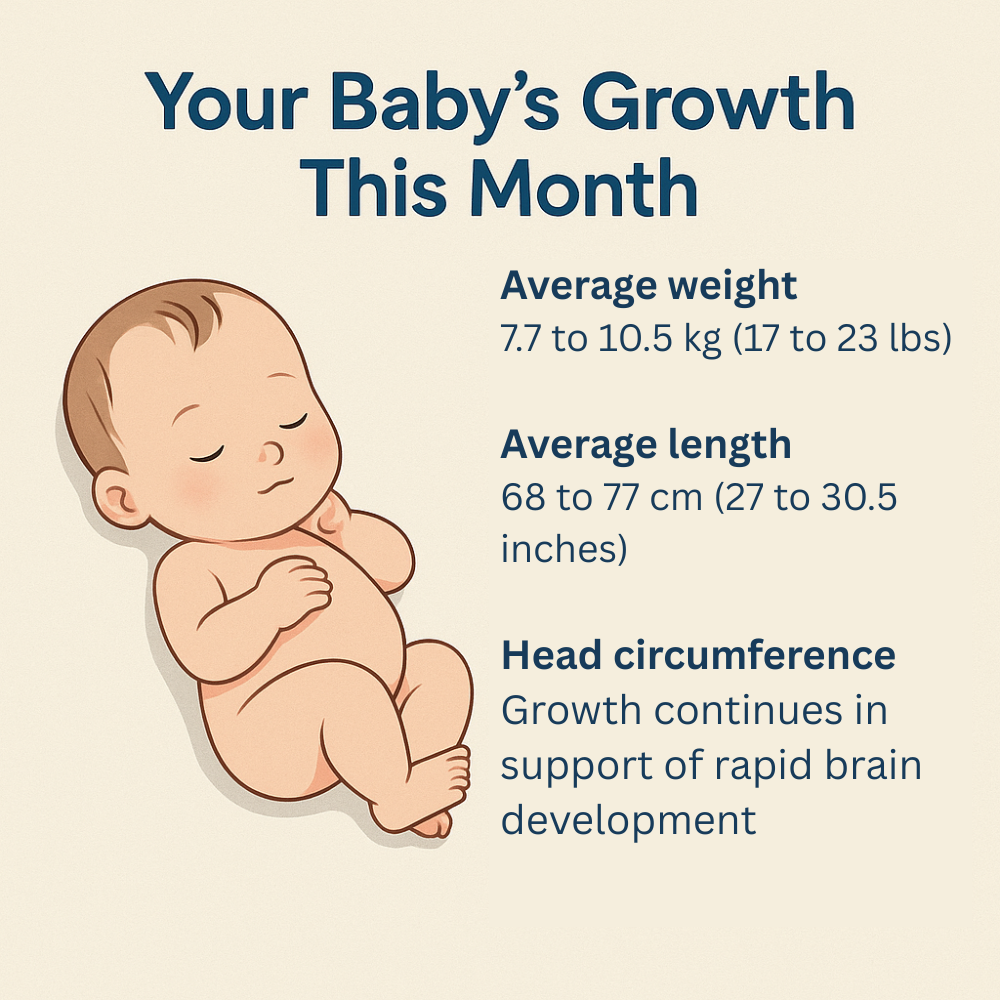Milestones, Growth, Sleep, Feeding, and Practical Tips for the Eighth Month
Your 8-month-old baby is growing into a curious, expressive, and increasingly mobile little explorer. With new skills developing rapidly—like crawling, standing with support, and using the pincer grasp—this is a big month for motor development and social engagement. You may also notice more distinct preferences, stronger attachment behaviors, and growing vocal abilities.
Here’s what to expect during your baby’s eighth month.
🍼 Your Baby’s Growth This Month
- Average weight: 7.7 to 10.5 kg (17 to 23 lbs)
- Average length: 68 to 77 cm (27 to 30.5 inches)
- Head circumference: Growth continues in support of rapid brain development
Note: Keep tracking growth percentiles and discuss any concerns at regular health check-ups.
👶 Developmental Milestones
At 8 months, many babies:
- Crawl with more confidence (on hands and knees, scooting, or rolling)
- Pull up to stand with support from furniture or a caregiver
- Use the pincer grasp to pick up small items like cereal pieces
- Respond to their own name consistently
- Express emotions through tone and facial expressions
- Understand simple words like “no” or “bye-bye”
- Babble with more variety, including consonant sounds (e.g., “ba,” “da,” “ma”)
🎯 Firsts to Watch For
- Pulling up to stand using furniture or your hands
- First signs of separation anxiety or clinginess
- Waving “bye-bye” or mimicking simple gestures
- Imitating sounds or syllables in a conversational tone
- Recognizing familiar people and reacting differently to strangers
🍽 Feeding & Nutrition
- Breastfeeding: Continue 4–5 times a day or on demand
- Formula feeding: 4–6 ounces per feeding, around 4–5 times daily
- Solids: By now, your baby should be exploring a wide range of soft foods, including purees and safe finger foods
- Examples: mashed avocado, soft fruits, well-cooked vegetables, scrambled eggs (if cleared for allergies)
- Introduce new foods one at a time to monitor for allergic reactions
- Continue offering water in small amounts during meals
🌙 Sleep Patterns
- Total sleep: 12 to 15 hours per day
- Day naps: Typically 2 naps (morning and afternoon)
- Night sleep: Some babies sleep through the night, but night wakings are still normal
- Separation anxiety or developmental milestones may briefly disrupt sleep
Tip: Keep sleep routines consistent and calming—bathtime, songs, or quiet cuddles before bed can help.
💉 Vaccines & Health Checks
- 8-month check-up: Not routine in all regions, but some pediatricians schedule visits to monitor motor development, growth, and feeding
- Ask about upcoming vaccines and flu shots (if in season)
- Discuss any teething pain, food allergies, or delays in crawling or standing
🤒 Common Health Notes
- Teething is common—look for drooling, chewing, mild fussiness
- Falls and bumps may increase with standing and crawling attempts—keep a close eye on babyproofing
- Stranger anxiety may begin or increase this month
🔔 Parental Care Reminders
- Offer safe furniture or toys to encourage pulling up and standing
- Avoid walkers (which are unsafe) and instead use floor time to build strength
- Continue reading, singing, and talking to nurture language development
- Prioritize breaks and support—your baby’s increased mobility can be physically demanding
✅ Pro Tips for Parents This Month
- Give your baby supervised floor time for free movement and exploration
- Let them self-feed soft finger foods to build independence and coordination
- Play interactive games like peek-a-boo or clapping hands
- Narrate your actions (“Let’s get your socks!”) to build early language and understanding
Feeling Overwhelmed? Let’s Talk! Join Our Parent Forum and Get Expert Advice & Support!
Final Thoughts
At 8 months, your baby is developing fast—both physically and socially. This is a joyful, high-energy phase filled with growth, connection, and exploration. While your days may feel busier than ever, your baby’s increasing interaction and awareness make this month especially rewarding.
Visited 128 times, 1 visit(s) today





